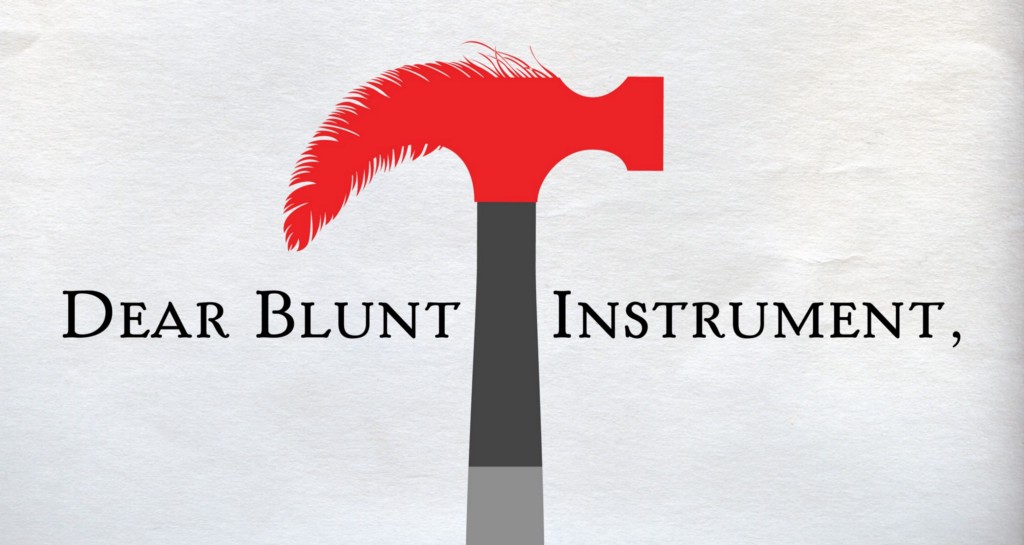interviews
What If Someone Else Writes a Book Exactly Like Mine Before I Get a Chance?
The Blunt Instrument on dealing with a novel doppelganger

The Blunt Instrument is an advice column for writers. If you need tough advice for a writing problem, send your question to blunt@electricliterature.com.
Dear Blunt Instrument,
I’m a creative writing graduate student nearing the end of my program, and have been working on my manuscript for about 5 years. I’ve gotten pretty good feedback on it from my advisor and classmates, have published some small selections in literary journals, and even received a few emails from agents. Though pushing through the last bit of revision has been incredibly difficult, I was so happy to be nearing the end, finally beginning to feel satisfied with the work and what it was saying, and excited to begin querying for real.
Then, I clicked a link about upcoming titles and found a book so similar to mine that it felt like the floor dropped out from under me. I’m not talking about basic similarities here, as in “Oh no, this person also wrote and published a story collection about a women’s rugby team.” It’s more along the lines of “Oh no, this person also wrote and published a story collection about a women’s college rugby team that includes murder and time travel and the occasional ghost.” The more I read about this other book, the worse it got. Knowing this, I think it would be exceedingly difficult to pitch my book to an agent, or to place it in a small press book contest, especially since this other book is available now and undoubtedly it’ll seem like I’ve copied the concept, form, material — everything. How many story cycles about women’s college rugby teams coming of age, committing murder, and traveling through time does the world really need?
My writer friends have remained firmly on the encouraging side, insisting that it’s my voice that matters and there’s still hope for my book. I love my friends and feel like they’re mostly trying to motivate me through the end of my degree, especially since I had to take time off for personal reasons. But I think my book is dead. Of course I know that even if this other book didn’t exist, there’s no guarantee mine would ever be published. But my belief in the project and that possibility were important. It’s also been suggested that I could revise the book again, though the changes required would be radical, and I’d be making them solely in response to the fact that there’s suddenly no market for this book I’ve poured everything into (made worse by the knowledge that there obviously was a market for it that I missed out on).
So, I guess what I’m asking is: how do I proceed with final revisions on a book that has no realistic hope of ever being a book? And, more importantly, once this book is immediately and forever back in the drawer, how do I keep going?
Thank you,
SD

Dear SD,
I understand how discouraged you must feel — it’s like your book got “scooped.” (I once read that scientists often have to publish their results before they understand them, to make sure they publish them first.) But the more I think about it, the more I’m sure the situation isn’t as devastating as it seems.
Here’s how I see it. Either this other book — we’ll call it Clone Book — is a hit or it isn’t. If it doesn’t become a runaway bestseller, then it’s really no problem. You can operate as though Clone Book doesn’t exist. It’s entirely possible that the agents or publishers you’re querying won’t have heard of the book or won’t be familiar enough with it to immediately see all the similarities that you see. This seems like the most likely outcome, because most books aren’t huge hits. If an agent you reach out to does say something like “This sounds a lot like Clone Book” — you can be honest and say that it’s a coincidence. Given the timing, there’s no way you could have copied the book, because you’re in the editing stages and Clone Book just came out.
If Clone Book does become a big seller, I honestly think this can only help you. You can use it as a comp title in your pitch letter to illustrate that there’s a clear market for books like this. You ask “How many story cycles about women’s college rugby teams coming of age, committing murder, and traveling through time does the world really need?” But generally when readers love a book, they don’t just read that same book over and over; they want to read more books like it! Agents and publishers know this, and they will be actively looking for similar books to sell. Remember when The Hunger Games first came out, and suddenly everyone was writing dystopian YA novels? There have been multiple nonfiction books about wolves in the last year. There’s a book on the bestseller list now called The Woman in the Window about a drunk who (maybe?) witnesses a murder; seems like a clear nod to The Girl on the Train. It takes a little while for a trend to die, and two books isn’t even a trend yet.
You’ll want to be able to say something like, ‘Fans of Clone Book will run out to buy my book, and be delighted to find that it’s campier and laugh-out-loud funny.’
You may be thinking that it’s better not to know, or you may be afraid to learn the extent of the similarities, but if Clone Book is making a big splash, you should probably read it. That way you’ll be able to confidently speak to both the similarities and the differences. And I have no doubt there are differences. Beyond genre and the thematic/plot overlap, think about elements like tone, style, and audience. You’ll want to be able to say something like, “While the subject matter covers similar territory as Clone Book, my book is aimed at a more literary audience,” or “Fans of Clone Book will run out to buy my book, and be delighted to find that it’s campier and laugh-out-loud funny.” It would also be good to have one or two other books in mind with a strong family resemblance to yours, so you can describe your book as “a cross between Clone Book and Other Bestseller,” or “a rugby story in the mold of Clone Book but with the formal inventiveness of Other Bestseller.” That will take some of the burden of comparison off Clone Book.
The details of your particular situation may be unusual, but I think your anxiety speaks to a larger question that all writers face: Can we truly be original? I often have the experience of reading something that uncannily echoes something I’ve just written, and of course my first thought is, Is everyone going to think I plagiarized this? It’s actually very hard to have a completely original idea. Plus, if you are writing about a topic that nobody else is writing about, you have to wonder if that’s because nobody is interested in reading about that topic.
There are a lot of books out there and just not that many fundamentally new ways to approach putting words on a page.
Most of the time when people say in a blurb or a review, “So-and-so is sui generis! There’s no other book like this!” they’re either lying or just wrong. It may be trivially true (no other book contains the exact same words in the exact same order) but not compellingly true. There are a lot of books out there and just not that many fundamentally new ways to approach putting words on a page. Fragmentary books, for example, are always blurbed as though the author just invented the fragment, but in reality books are almost always working in a clear tradition — even if the author is unaware of that tradition.
Being too original will be seen as a liability by most agents and publishers, since they won’t know how to market you. (Even if a publicist decides to hype up a book as “totally new and original,” who they find to call it original will speak volumes about how they really want you to perceive the book.) On the other hand, you really can’t avoid some degree of originality. This is why I know there must be appreciable and important differences between Clone Book and your book.
My husband keeps a little letter-pressed card on the wall over his writing desk, with a quote by Martha Graham. It’s taken from Graham’s biography, written by Agnes de Mille, another choreographer. De Mille once met Graham for sodas in a Scrafft’s (an old chain restaurant in Manhattan), seeking consolation — she felt her best work had been ignored, while recent work she wasn’t very proud of (the choreography for Oklahoma!) had met wild success. Graham gave de Mille the greatest advice of her life:
There is a vitality, a life force, an energy, a quickening that is translated through you into action, and because there is only one of you in all of time, this expression is unique. And if you block it, it will never exist through any other medium and it will be lost. The world will not have it. It is not your business to determine how good it is nor how valuable nor how it compares with other expressions. It is your business to keep it yours clearly and directly, to keep the channel open. You do not even have to believe in yourself or your work. You have to keep yourself open and aware to the urges that motivate you. Keep the channel open.
You wrote your book; no one else could or would do it the same way. I think it’s much too early for you to give up on it. I hope you’ll reach out to those agents who showed early interest, and give them the chance to evaluate the market for your book.








